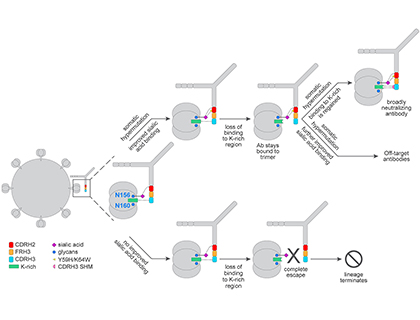

TSRI Study Reveals New Clues to How a Successful HIV Vaccine Could Work
Sugar molecules on HIV envelope protein are likely target for future candidate vaccines.
Scripps Florida Scientist Awarded $2.5 Million Collaborative Grant to Develop New Diabetes Treatment
Patrick R. Griffin, co-chair of the Department of Molecular Medicine on the Florida campus of The Scripps Research Institute (TSRI), has been awarded a $2.5 million collaborative grant with Brigham and Women’s Hospital by the National Institute of Diabetes and Digestive and Kidney Diseases, part of the National Institutes of Health (NIH).

Calibr and TSRI Executive Matt Tremblay Receives Biocom Catalyst Award
Matt Tremblay, Ph.D., Chief Operating Officer of the California Institute of Biomedical Research (Calibr) and Vice President of Business Development at The Scripps Research Institute (TSRI), was named one of Biocom Inc.’s annual Life Science Catalyst Award winners.
Jeffrey Rudolf Receives (K99/R00) NIH Career Transition Award
Jeffrey D. Rudolf, a postdoctoral researcher on the Florida campus of The Scripps Research Institute (TSRI), has been awarded a Pathway to Independence Award (K99/R00), a highly competitive career transition grant from the National Institutes of Health’s National Institute of General Medical Sciences. Rudolf will receive more than $900,000 over five years to support his research on discovering new drugs from natural resources using cytochrome P450 enzymes.
Scott Henderson Joins TSRI as Director of Microscopy Core Facility
Scott Henderson, who has been directing microscopy core facilities for nearly 25 years, loves to talk about how such facilities help scientists explore essential cellular functions and gain a better understanding of the mechanisms associated with disease.














